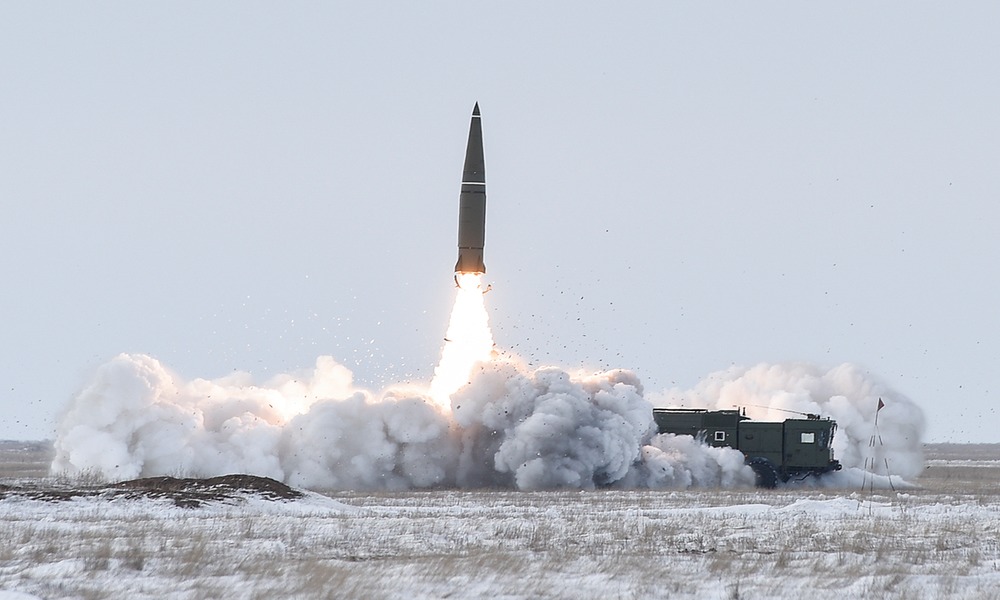RUSSIA MONITOR
Date: 31 January 2019
U.S. Withdrawal from the INF Treaty is Russia’s Defeat
Last-ditch talks, which took place in Beijing to save the landmark INF Treaty, failed to bring any results just a few days ahead of the expiration of a U.S. deadline for Moscow to comply with the treaty. Russia still claims that it does not violate the provisions of The Treaty on the Elimination of The Intermediate-Range and Shorter-Range Missiles, commonly referred to as the INF. However, all evidence held by Washington and its allies seems to say otherwise. This means that the United States will withdraw from the deal while launching works on obtaining such a weapon. This may in the long run result with Russia’s strategic defeat as the U.S. deployment of both medium and intermediate-range missiles change the existing balance of power in Europe. Moscow seems to dominate over the matter, though.

Russia and Washington have failed to make any progress since their Beijing talks that were held on January 31. The Russian delegation was headed by Russian Deputy Foreign Minister Sergei Ryabkov while the U.S. group was led by U.S. Under Secretary of State for Arms Control and International Security Andrea Thompson, both of whom admitted that the negotiations had failed to change the existing state of affairs as the two countries had not managed to bridge their differences.
The Intermediate-Range Nuclear Forces (INF) Treaty is a treaty signed by U.S. President Ronald Reagan and leader of the Soviet Union Mikhail Gorbachev in 1987, prohibiting all missiles with ranges between 500 and 5,500 kilometers. The agreement provides for liquidating intermediate-range ballistic missiles and medium-range missiles as well as it forbids to produce, possess and launch such rockets. In 2014, the U.S. Department of State raised for the first time an issue of breached obligations yet this question had been also mentioned five years earlier. Back in December 2017, the U.S. Department of State put forward specific allegations, accusing Moscow of violating the landmark INF Treaty, believing the Kremlin to have deployed 9M729 cruise missiles. These are in fact a larger version of the Iskander-K short-range cruise missile. However, Russia rejects these claims, saying the United States disobeyed the deal by deploying a component of a missile defense system–the Mark 41 Vertical Launch System (VLS), capable of launching offensive missiles. According to the U.S. administration, VLS is to be placed onboard while the INF Treaty provides for ground-based systems.
Last year, Washington offered Russia an ultimatum to return to compliance with the treaty whose deadline was set for February 2. The U.S. termination of the arrangement will take effect six months after the formal notification of such intent. Suspending its obligations resulting from the deal would allow the U.S. military to immediately begin developing its own missiles. Following its withdrawal from the INF Treaty, the United States will be able to develop a missile whose range may face Russian threats. This is likely to restore part of mutual deterrence strategies in Europe. In October 2018, Russian President Vladimir Putin said Russia would immediately target any European nation that agreed to deploy U.S. medium-range missiles on their soil, warning that European states would expose themselves to a possible counterstrike.
Washington’s decision to pull out of the deal will trigger an immediate response from Moscow, also ready to quit the agreement. Yet this seems of little significance for the West, given the fact that the deal has long been referred to as fiction, with only one part being committed to its provisions. From the U.S. point of view, the bilateral agreement became unnecessary while preventing Washington from taking actions. And yet the world is no longer of bipolar character whilst new players have appeared on the international arena. Already in April 2017, the former commander of U.S. Pacific Command Harry Harris recommended that the United States renegotiate the INF Treaty due to its limited capabilities to counter “Chinese and other countries’ cruise and land-based missiles.” A threat posed by China, a country that is not covered by the INF Treaty and keeps developing its medium-range missile arsenal, might in fact have been the main reason for Washington’s current stance on the deal. Russia gave only a pretext, which is still good news for Europe’s future security.
_________________________________
All texts published by the Warsaw Institute Foundation may be disseminated on the condition that their origin is credited. Images may not be used without permission.














